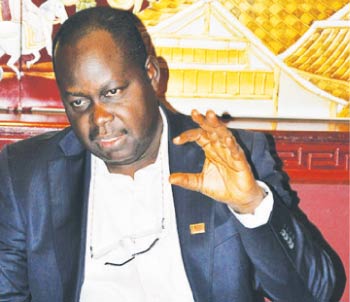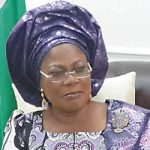
Reforms In Osun Aimed At Achieving Transparency – Bolorunduro
Excerpts from an interview with the State Commissioner for Finance, Dr. Wale Bolorunduro, as he spoke on the benefits of the Sukuk bond and the economic implications of the school merger and re-classification of schools into elementary, middle, and high schools.

Sukuk is a financing option like a bond, it is a means of raising long term funds under fixed returns in which interest is not allowed, rather it allows investors to participate with the sponsor in raising funds. Apart from the name, it is not different from the conventional bond.
Since it is not different from conventional bond, why Sukuk?
Sukuk has a structure which allows government to give part of its assets to the special purpose vehicle required to raise funds, the vehicle is also owned by government, provide and build schools in which the schools are given back to government, because of the additional comfort that government is providing. The price is cheaper; the price is now the return that will be paid back to investors. The investors feel comfortable in the sense that it is not like the conventional bond; the purpose is known with certainty because of the special purpose vehicle.
The special purpose vehicle is a public company with article and memorandum of association. Also, because the object of the company is known, investors are sure that their money will not be diverted to something else. This makes government to be more transparent and in the final analysis it enables sponsors to achieve cheaper rate. Osun under Ogbeni Rauf Aregbesola was able to get N11.4 billion at the return of 14.75 percent at the time rate at the money market was at 25 percent and even interbank rate, which is the rate at which banks lend money to one another, was about 25, 30 and even went up to 40 percent for some days at that period and we were able to attract investors at 14.7 percent return. It was that structure that enables us to attract that investment at that fixed rate; so, if interest rate goes up to 30 or 40 percent in the future, we are not affected. But I want to make it clear that apart from Sukuk which is the name or nomenclature, we are not under any religious jurisprudence or covenant but the structure open spaces for additional investors who will not want their funds go to vanity objectives.
Majority of the investors and asset managers companies that invested are headed by Christians. The bond is regulated only by capital market authorities, which are Securities Exchange Commission (SEC), Nigeria Stock Exchange. If by tomorrow we find a Christianity financing nomenclature whose structure will allow us to raise cheaper funds within our borrowing limit, we will take it, for us, we know what we want to achieve, we know the kind of structure that suits us, we know our needs, we want to be transparent and that is what we are doing with the bond.
Not quite long ago the state raised N30bilion bond from the capital market and now N10billion Sukuk, tell us what you intend doing with this funds or what you have done with it.
Let me tell you, when Mr. Governor took over the mantle of leadership, he came up with a programme codified as six integral action plans. What we did in the finance ministry was to elevate the plan to 50 feet above the ground. The plan is meant to banish hunger, reduce unemployment, banish poverty, promote healthy living, restore peace and harmony, and fix the education sector. We came up with medium term expenditure framework; all the capital expenditure and critical/mandatory expenditure over the next seven years had to be considered.
The next to be considered was the fiscal strategy, we looked at revenue and expenditures of government over a seven (7) year period. The central point is the Internally Generated Revenue, and we had to benchmark the IGR penetration ratio. Osun, under the previous PDP administration, was below national average and South West zonal average. The strategy of Ogbeni Rauf Aregbesola was to move quickly above national average; so it was moved from 300m monthly to 600 million within the first year without introducing new taxes, and at that level it was above national average and close to regional average. Then, it was taken to one billion and now it is over one billion.
The objective of the fiscal strategy is to optimize resources and maximize revenue. This means Osun will be re-engineering its revenue, which is what the state has been doing and it includes automation of revenue, etc. The state is now focusing on tax audit and tax audit is to recoup taxes owed years back. Also, Ogbeni Aregbesola’s administration has blocked leakages in areas of salary payment expenses, pension and gratuities. His reform programmes has attracted the World Bank, which is helping the state under state and local government governance reform and I believe this will lead to supports in the near future. Now, the funds realized from Sukuk will be used to build specifically state of the art schools with bigger classroom capacities and state of the art infrastructures, laboratories, etc.
The state under Governor Rauf Aregbesola plans to spend N36 billion over the medium term to develop the education sector. N5 billion has already been committed by government while the N11.4 billion realized through Sukuk will also be used for the same purpose, which means the state has N16 billion presently. We are building 100 elementary schools, 50 middle schools and 20 High schools in different locations over the next two to three years.
The state chapter of Christians Association of Nigeria (CAN) has kicked against the education reform and alleged that Governor Rauf Aregbesola wants to Islamise the state, what is your reaction to this?
Governor Aregbesola has no plan to Islamise the state; what he is doing is to uplift the quality of education in the state, which before now was near a total collapse, especially with poor performances of students in both internal and external examinations. The present reform is the outcome of the education summit of February 2011 under the Chairmanship of Professor Wole Soyinka. In the past, classrooms were crowded, funding of education was poor, and there was lack of instructional materials and high school fees in tertiary institutions. These are what the reform is trying to correct.
The schools are divided into elementary level which comprises pupils from ages 6 to 9, which corresponds to primary one to four. The middle level, from primary 5 to JSS 3, of ages 10 to 14, classified as grades 5-9, and the high school level age range will be 15 and 17 years, corresponding to senior secondary school to be known as grades 10-12 and this has not contradicted the universal basic education, which stipulates 9 years under basic education. So, in realigning the high schools, it is a situation whereby rather than having 200 students in one school and having 300 in another school, the state will put them in the bigger school that has much bigger space. The population of the students in public schools in the State follows UNESCO standard. Government will provide school buses where there are needed for them.
In reclassifying the schools, the ministry of education was mindful of religious differences and avoided classifying muslim public schools with Christian public schools despite the fact that they are both funded with public funds. There is no need for Christian Association of Nigeria (CAN) to raise alarm.
Then the peculiarity of the state now, according to demographic distribution, released by the National Population Commission (NPC), shows that between the ages of 0 and 17 years, Osun has more boys than girls, so having single sex schools limits capacity and it is constrained by demographic reality.
What is the economic implication of the merger and reclassification of public schools?
The essence of the re-classification and merger is to optimize resources and take advantage of economy of scale rather than having two (2) schools within the same block. You can have them together and consolidate your resources. These are some of the things the new education reform addressed, especially the needs and fiscal strategy, rather than spend N2 million in one place and another N2 million in another within the same block as running cost. N3 million can be spent in one place and achieve quality purpose in one location within the same sphere. The elementary school remains a school within the neighbourhood.
DAILY INDEPENDENT



